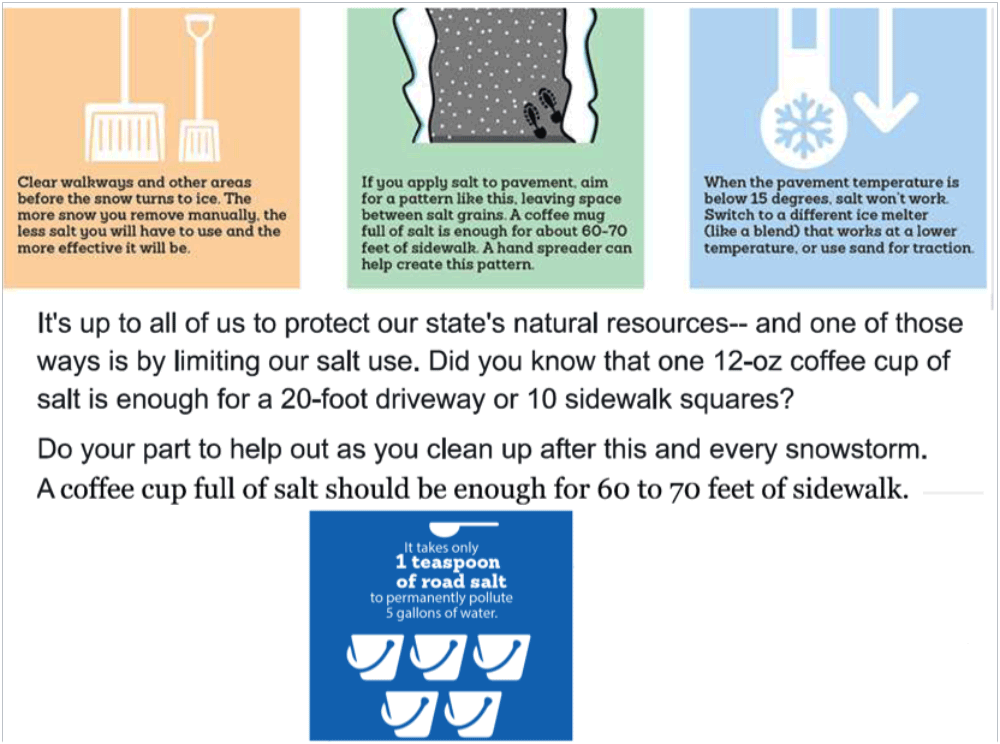1. Lake users are reminded that with the deeper water now present in the dredged portions of the lake, and the recent variations in temperature, ice formation on the lake so far this winter has been unpredictable at best. Please use extreme caution attempting to access the lake, unless you are positive of safe ice conditions.
2. Another feature of our current winter has been a number of ice events, which can make moving about safely a bit of a challenge. While the use of ice-melting salt on roadways driveways and sidewalks can help make conditions less slippery in certain conditions, it is important to note that this same salt can end up in our groundwater drinking water supply, as well as Wonder Lake and Nippersink Creek. De-icers are often applied under the “more is better” approach, which can have negative impacts. Information is provided on Page 2 about salt impacts and proper deicer applications.
3. The regularly scheduled “3rd Saturday” Nippersink Watershed Association Merchant Creek workday will be held on Saturday, February 16th, 2019 to clear invasive brush from a portion of the Merchant Creek stream corridor. This volunteer work is being done in advance of an upcoming IEPA Section 319 funded stream stabilization project to help minimize the significant amounts of sediment that this parcel has delivered to Wonder Lake over the past decades. Please note that a new meeting location is being used for this workday. Volunteer’s will meet at 8 am at the north end (dead end) of Park Drive, just north of Wooded Shores Drive. Park Drive is the second side street off Wooded Shores Drive coming west from East Wonder Lake Road. As always, volunteers are welcome, as volunteer time counts towards a ICECF grant also obtained by the NWA.
4. The 34th Annual Illinois Lakes Management Association Conference will be held at the Crystal Lake Holiday Inn in Crystal Lake, IL from March 14 – 16, 2019. A number of Wonder Lake residents have already registered. Given the proximity to Wonder Lake, this would be a great opportunity for WL folks to learn more about a wide variety of lake topics. For more details: http://www.ilma-lakes.org/conference
5. As many have observed, the population of Cormorant’s on Wonder Lake seems to be increasing each year. For the past few years, the MPOA has worked with the Illinois Department of Natural Resources to conduct “legal” harassment of Cormorant’s, particularly at those island locations where they congregate to roost. The establishment of roosts result in large amounts of “droppings”, that can over time kill off desirable species of trees and vegetation, such as the Oak trees on Strom Island, where native plant restoration work has been impacted. We are continuing to explore options with the U.S Department of Agriculture and the U.S. Fish & Wildlife Service. An article discussing various Cormorant impacts can be found at:
http://wildlife.org/the-rise-of-double-crested-cormorants-too-much-of-a…
Our Lakes Are Getting Saltier
According to research from Center for Limnology, North America’s lakes are getting saltier. And this is mostly thanks to the use of salt to clear winter roads and parking lots here in the Midwest and the Northeastern U.S.
In fact, 44% of North America’s lakes are getting saltier. If current trends continue, many North American lakes will surpass Environmental Protection Agency (EPA)-recommended chloride levels in 50 years. According to a recent study, 14 North American lakes are expected to exceed the EPA’s aquatic life criterion concentration of 230 mg/L by 2050, and 47 are on track to reach chloride concentrations of 100 mg/L by then, which is bad news for the plants and animals that call them home. While some species may be better able to tolerate salty waters than others, our native species are adapted to freshwater. Salt will stress them out and any kind of stress is taking away from their ability to survive and reproduce.
Elevated chloride levels have also been shown to alter the composition of fish, invertebrates and the plankton that form the base of the aquatic food web in lakes. Aquatic species richness and abundance can decline, and in extreme cases salinization can prevent lakes from mixing, causing low oxygen conditions that smother aquatic life and reduce water quality.
http://blog.limnology.wisc.edu/to-keep-our-freshwater-fresh-we-need-to-…

